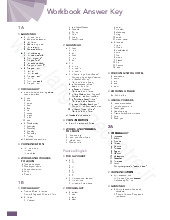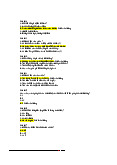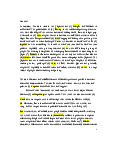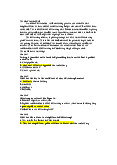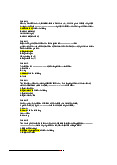








Preview text:
Unit 8: Exercise 1
In this unit, you will practise all three parts of the IELTS Speaking test.
Read the advice for the IELTS Speaking test. Is the advice Good advice or Bad
advice? Choose the correct answers.
1. Memorise as many Part 2 tasks as possible, so that you know exactly what you are going to say. o Good advice o Bad advice
2. Record yourself answering questions, and try to address your strengths and weaknesses. o Good advice o Bad advice
3. In the test, speak as quickly as possible, so that the examiner can see how fluent you are. o Good advice o Bad advice
4. Take your phone into the test, so that you can record yourself in case you need to do the test again. o Good advice o Bad advice
5. Make sure you arrive in good time for the test, and try to find out where the room is before the day of the test. o Good advice o Bad advice
6. Make sure that you have the correct identification documents. o Good advice o Bad advice
7. Use the task booklet that the examiner gives you in Part 2 to make notes on and to underline any key words. o Good advice o Bad advice
8. Don’t make eye contact with the examiner. They will think that you are being disrespectful. o Good advice o Bad advice
9. Ask the examiner for feedback at the end of the test. o Good advice o Bad advice Unit 8: Exercise 2
Read the information. Then look at the questions in the box. Do they come from
IELTS Speaking Part 1 or Part 3? Complete the table with the questions.
In IELTS Speaking Part 1, most of the questions will be on topics you are familiar with and
can talk about from personal experience. In Part 3, you will be expected to expand your
answers and speak in more general terms.
Are there any traditions that you especially enjoy?
How important do you think it is for a society to keep its traditions?
What is the most important festival in your country?
Do you think the government should fund museums and art galleries?
Do people usually have meals together in your culture?
Do you think traditions that we have today will survive in the future?
Which other foreign language would you like to learn?
Do you think that we should maintain old buildings and monuments? Part 1 Part 3 Unit 8: Exercise 3
Watch the video of a native English speaker answering four IELTS Speaking
Part 3 questions. Put the questions that the speaker answers in the correct order.
can you remember a place that you visited that made a big impression on you?
Is there anywhere you would especially like to visit?
What advice would you give to visitors to other countries?
What do visitors to your country dislike? Question 1: Question 2: Question 3: Question 4: Unit 8: Exercise 4
Read the IELTS Speaking Part 1 questions. Then listen to the answers. Choose the best answers.
1. Can you tell me where you come from? o o
2. What is the most important festival in your country? o o
3. Which other foreign language would you like to learn? o o
4. Do people usually have meals together in your country? o o Unit 8: Exercise 5
Read the responses to the IELTS Speaking Part 3 question: Do you think
extended families will become more or less common in the future? Choose the
correct examiner comments for the responses.
1. No, I think that people will live either separately or in nuclear families in the future. o There are too many mistakes. o The response is off-topic. o The response is too short. o
The student needs to use more cohesive devices. o The vocabulary is too basic. o This is a good response.
2. I think that fewer people will be living in extended families. More and more young
people are moving to different cities or countries. They leave their families behind.
They forget about the extended family. The older people don’t expect to be looked after. o There are too many mistakes. o The response is off-topic. o The response is too short. o
The student needs to use more cohesive devices. o The vocabulary is too basic. o This is a good response.
3. I think that people won’t live in big families with grandparents and uncles and aunts
in the future. They will live with their small family – husband, wife, son and daughter
– or they will decide to live alone because people like to be free, they don’t like to
live with their big family. It will be less common, for sure. o There are too many mistakes. o The response is off-topic. o The response is too short. o
The student needs to use more cohesive devices. o The vocabulary is too basic. o This is a good response.
4. I am thinking that extended family is critically for the most people, it is good people
has grandparents who can look at the children when they are busy and who can rely
on younger generation for help in their old age. o There are too many mistakes. o The response is off-topic. o The response is too short. o
The student needs to use more cohesive devices. o The vocabulary is too basic. o This is a good response.
5. For me, the extended family is important. I really like spending time with my
grandparents. For instance, I like the fact that I can go to them for support and that
they can rely on me for help when they are in need. o There are too many mistakes. o The response is off-topic. o The response is too short. o
The student needs to use more cohesive devices. o The vocabulary is too basic. o This is a good response.
6. In my opinion, at least in my society, the extended family is really important and, if
anything, I think that it will become more common in the future. Firstly, our culture
hasn’t changed as much as perhaps in other countries, so for us at least, the idea of an
extended family is still very common, and I can’t see people wanting it to change.
Secondly, due to the way the economy is, people cannot afford the high prices of
accommodation, so they will rely on their parents for longer, and the older
generations will expect their support in return. o There are too many mistakes. o The response is off-topic. o The response is too short. o
The student needs to use more cohesive devices. o The vocabulary is too basic. o This is a good response. Unit 8: Exercise 6
Read the information. Then read the IELTS Speaking Part 3 questions. Put the
sentences in the correct order to complete the responses.
A useful way of answering IELTS Speaking Part 3 questions is to structure your response in the following way: 1. Make a statement. 2. Explain your answer. 3. Support your statement.
1. How should tourists behave when they are in a different country?
I think that people should behave with respect for the local traditions and culture when
they are in a different country.
For me, it is really annoying when tourists visit the ballet in my country and are dressed
casually. For us, it is important to be dressed smartly, and I think that they should follow
these rules like I do when I visit another country.
For example, I think that they should do some research on the place that they are going to
and see how they should behave in certain circumstances. 1. 2. 3.
2. Why do so many people enjoy participating in national celebrations?
That said, I think that the key thing is that people are enjoying themselves, and it doesn’t
matter to them if it is to celebrate the accomplishments of the nation or something that is
personal to them or their families.
The reason I believe this is that if you take my country, people are very keen to
participate in Independence Day, when there are a lot of concerts, parties and other
festivities, but if it is something more sombre like a memorial day, fewer people attend.
In my opinion, taking part in national celebrations helps people feel part of society and
allows them to feel proud of the nation, and of course the celebrations are quite often a lot of fun. 1. 2. 3.
3. Do you think that we should maintain old buildings and monuments?
I suppose that it’s in everybody’s interests for old buildings to be preserved from a
historical, cultural and economic perspective, and as the government raises taxes from the
public, it should be down to the government to fund these projects.
What’s more, as well as providing a source of national pride and interest for the public,
historic buildings help to attract tourists, who want to visit these attractions and are
willing to pay good money to visit them.
I think that it could be argued that the government should be made to pay for the upkeep
of old buildings and monuments, as they are part of the country’s culture and heritage. 1. 2. 3.
4. Do you think that the traditions that we have today will survive into the future?
Younger generations have fully embraced the possibilities of moving away from their
traditional homes, communicating with people from other countries and participating in a global economy.
I really don’t think that traditions will be of any importance to future generations. Most of
the old traditions and customs have already been forgotten, and the development of
technology means that people are becoming less and less interested in the past.
We can see that improvements in technology have led to people abandoning old working
practices, and this gives them fewer ties to the past. 1. 2. 3. Unit 8: Exercise 7
Read the information. Then complete the responses to IELTS Speaking Part 3
questions with the phrases in the box.
Indefinite pronouns with a defining relative clause (e.g. anyone who and something that) are a
good way of making general statements. They can be useful in IELTS Speaking Part 3.
Differences between cultures are something that Everyone who I am someone who
I don’t know anybody who Something that Somewhere that Unit 8: Exercise 8
You are going to practise some IELTS Speaking Part 1 questions.
Listen to the examiner. Record your answer. Play to hear your answer. Unit 8: Exercise 9
You are going to do IELTS Speaking Part 2. You will need some paper and a pencil.
Listen to the examiner. Record your answer. Play to hear your answer.
Describe an interesting tradition that you have in your country. You should say: what the tradition is
where you think this tradition came from
what people do as part of this tradition
and explain why you think this tradition is interesting. Unit 8: Exercise 10
You are going to do IELTS Speaking Part 3.
Listen to the examiner. Record your answer. Play to hear your answer.
